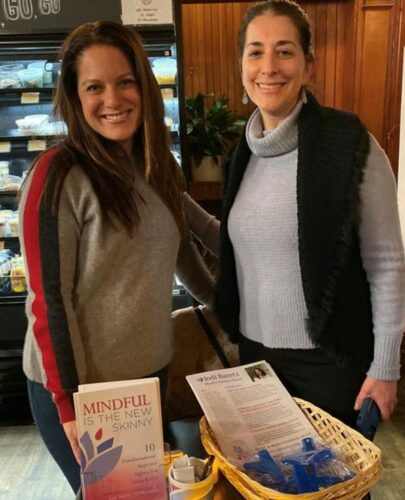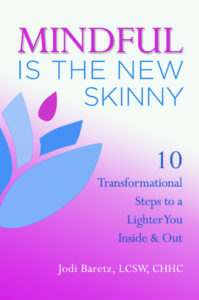By Sabra Staudenmaier
“The mind is its own place, and in itself can make a heaven of hell, and a hell of heaven.” –John Milton

So, what is mindfulness, anyway?
Mindfulness starts with slowing down, and paying attention to the present moment. The goal is to calmly acknowledge and accept one’s feelings, thoughts and body sensations. They say if your thoughts are stuck in the past you will suffer from depression. If they are racing around in the future, you will have anxiety. It’s all about bringing your brain into the now. Yes, COVID-19 has turned our world upside down, but mindfulness can help us regulate our thoughts and ease our racing mind. Peace, my friends, can be found in the here and now. If we are able to remind ourselves “I am safe today. I am ok today.” We can get through this with more serenity.
Sounds good…but how exactly do I practice mindfulness?
Come into the present moment on purpose. Find a nice, quiet and calm place to sit. Start noticing your breath. Yay! You’ve started meditating! During meditation, we strengthen the “muscle” of the mind. When we focus on something in the present, like our breath, our mind will inevitably start to wonder to the thoughts that we cannot control. This is normal. Once we realize that our mind has drifted, we can bring our attention back to the present. In doing this we have completed a “rep” of building the muscle of the mind. If we do this often enough, just as if we lift a weight often enough then the muscle in our body will strengthen, the muscle of our mind also strengthens. When we fortify the muscle of the mind, we can direct attention purposefully and use conscious awareness with more competency. This is what it means to be “mindful’. We can be attentive to and aware of our mind rather than living unconsciously in patterns that don’t serve us. This is a skill, like riding a bicycle, which improves with practice.
“Mindfulness means paying attention in a particular way, on purpose, in the present moment non-judgmentally to the unfolding of experience moment to moment.” – Jon Kabat-Zinn
I’m struggling to make sense of current circumstances
Mindfulness advocates acceptance of what is happening in the moment without trying to change it. It is tempting to try to avoid unpleasant feelings but we are human beings and as such are meant to experience the full range of human emotions -happiness, sadness, joy, loss, ease and suffering. The human experience is not meant to be easy or perfect and it’s ok if it’s not pretty. Arguing with what is creates unnecessary stress.
We cannot change the fact that this pandemic happened. Instead of resisting it, lean into it. What can we learn from this as a country? What can we learn from this personally? What will we take with us when this is done? Can this be part of our personal evolution? Mindfulness is about perception. It’s about how you choose to look at things.
“Rather than being disheartened by the uncertainty of life, what if we accepted it and relaxed into it? What if we said Yes, this is the way it is: this is what it means to be human, and decided to sit down and enjoy the ride?” – Pema Chodron
Embracing the less-than-perfect
One of my favorite parts of mindfulness is the notion of embracing imperfection. After all, to be human is to be imperfect. This doctrine is coming in very handy these days as my laundry piles up, dessert becomes breakfast and makeup fades into a luxury of the past. Using boxed hair dye is not the same as going to a professional salon, but, in the grand scheme of things, it’s good enough.
“Imperfections are not inadequacies; they are reminders that we’re all in this together.” – Brene Brown
The Beginner’s Mind
The beginner’s mind is the Buddhist concept of approaching something without preconceived notions. When we get back to our old way of life, we will be much more adept at doing this (for a time anyway). We will eat at a restaurant, go to the gym, spend time with groups of friends as if it was for the first time. We will have a renewed sense of appreciation, a comforting and hopeful prospect from a “beginner’s mind” perspective.
“In the beginner’s mind there are many possibilities, in the expert’s mind there are few” – Shunryu Suzuki
My Journey to Mindfulness
We can’t change our circumstances, but we can change our thoughts about them. Every so often something happens that shakes us and can wake us up. Ten years ago, my oldest son was diagnosed with Celiac Disease. I struggled to wrap my head around the changes needed to live with this diagnosis. My son’s doctor referred me to Jodi Baretz, a local psychotherapist with a specialty in mindfulness and health coaching. Not only did I learn how to mindfully manage my son’s new diet, but I was introduced to a whole new world. I realized that I had been living unconsciously, thinking by default and using old coping mechanisms that were no longer serving me. When I learned about mindfulness, everything changed. It was an awakening. This new way of thinking made future challenges easier to deal with, and gave me a joy and appreciation for life I had previously only imagined.
“When we are no longer able to change a situation, we are challenged to change ourselves” – Viktor Frankl
The Mindful Moms
Jodi continues to be my life coach; having her support has proven invaluable. A few years ago, we began collaborating. We wanted to help others improve their quality of life through mindfulness. The result has been the development of a community of “Mindful Moms.” Individually, and through groups, we work together to support others on their personal mindfulness journeys (www.mindfulmomsgroup.com). Free zoom support calls, such as “Namaste in Bed” and “Meditation and Cocktails or Tea”, are being offered to support the community in this time of need and can be accessed via the Mindful Moms Facebook page.
When I asked Jodi what her advice was on dealing with this quarantine, she said, “Do what you can to stay safe, be there for others and be kind to yourself but let go of what you cannot control. It’s normal to have good and bad days, try and ride the wave and remember these experiences, just like your emotions, are temporary.”
Covid-19 has shaken the world on a macro level. When circumstances shift, where do we go to find stability? Perhaps the answers lie in an unexpected place; conceivably navigating this new reality lies not in the world around us but rather within. If ever there was a time to take charge of one’s mind and thoughts, that time has arrived.
Just like we can decide how to attend to our body with food and exercise – we can also manage our minds. With a managed mind, when circumstances change and stress arises, like the tsunami of stress Covid-19 has brought – we have tools to help make sense of it. We can think consciously and use deliberate thoughts to act with awareness. We live in the physical world, but we also live in our heads. It’s worthwhile to make both a pleasant place to be.
Sabra Staudenmaier became interested in thought management while majoring in Philosophy at Tufts University. She is the program director for the Mindful Moms Inner Circle Group and helps facilitate two Facebook Groups: @Mindful Moms www.facebook.com/groups/mindfulmoms and @Mindful Parents of New York www.facebook.com/groups/MindfulParentsofNY. She is currently training to become a life coach.
This article is a sponsored feature of The Mindful Moms Group.
 Walking into Millwood resident Jodi Baretz’ office is like walking into a sanctuary. The atmosphere is hushed, shoes are left at the door, voices are kept to a whisper. The effect is immediately relaxing.
Walking into Millwood resident Jodi Baretz’ office is like walking into a sanctuary. The atmosphere is hushed, shoes are left at the door, voices are kept to a whisper. The effect is immediately relaxing. Mindfulness can also help with all aspects and relationships in your life, Baretz notes. “Mindfulness increases your capacity to deal with stress and overwhelming situations because you are learning how to calm your body and your mind,” she said. “It’s not shutting off your thoughts; rather, it’s pressing a ‘stop’ button on them so you can change your relationship toward them.” After all, we all face adversity in one way or another, and there are many things in life that are beyond our control. While we can’t control the challenges we face, mindfulness and meditation help us “struggle well,” she said. “By taming our minds and focusing on the present, we can decrease our anxiety.”
Mindfulness can also help with all aspects and relationships in your life, Baretz notes. “Mindfulness increases your capacity to deal with stress and overwhelming situations because you are learning how to calm your body and your mind,” she said. “It’s not shutting off your thoughts; rather, it’s pressing a ‘stop’ button on them so you can change your relationship toward them.” After all, we all face adversity in one way or another, and there are many things in life that are beyond our control. While we can’t control the challenges we face, mindfulness and meditation help us “struggle well,” she said. “By taming our minds and focusing on the present, we can decrease our anxiety.”
